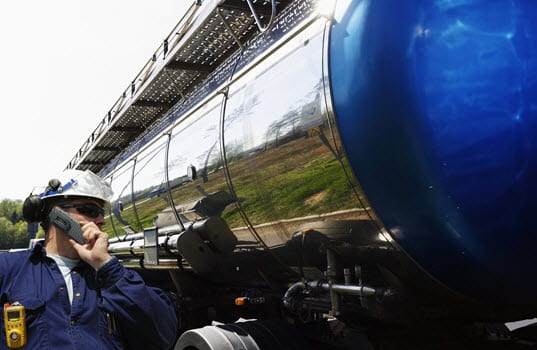By Mark Murrell, CarriersEdge
Remember when FedEx founder and CEO Fred Smith ended his pursuit of making overnight shipping possible because his college professor said it couldn’t be done? Or when Tesla CEO Elon Musk decided to start producing gas-powered cars, and later a truck prototype, because the technology to build “electric” was too difficult? Neither do I.
The point is, industry leaders don’t become industry leaders by sticking to what they have always been doing. No matter what industry, you have to take risks and come up with new ideas and ways of doing things to be competitive. A great quote that brings home the message was from John F. Kennedy, when he said:
“The problems of the world cannot possibly be solved by skeptics or cynics whose horizons are limited by the obvious realities. We need men who can dream of things that never were and ask “why not?”
Every year when we evaluate nominees for the Best Fleets to Drive For program, I’m reminded of fleets that go above and beyond to change the landscape of the industry. They want to better the industry.
We Can, and We Can’t
Over the 10 years we’ve been analyzing the Best Fleets to Drive For, we’ve collected a lot of data. This past year, we saw a crop of fleets that face the industry’s challenges with a range of innovative approaches and creative solutions. Every year we see something different. Something innovative. But….
We also saw, as we do every year, a good number of fleets that are stuck in the trap of “we can’t-ism.” Yes, that’s a made-up phrase, but it accurately sums up the litany of excuses we hear about why fleets can’t do one thing or another.
As we go through the evaluation, we ask fleets a lot of questions, in a lot of different areas, and often we’re asking questions about things they haven’t really thought much about before. Not surprising, they may not be doing much in those areas. And, that’s fine – part of the value of the Best Fleets program is looking at different things, in different ways, to continually improve the business. Sometimes fleets will recognize that a question is probing an area they haven’t considered before, and they’ll start thinking about what to do about it. That’s what we hope for.
But, other times, fleets will explain why they couldn’t possibly be expected to do it, insinuating that we really shouldn’t be asking about it in the first place. They get defensive. Then we explain that if we’re asking about it, it means at least one fleet has figured it out and is executing a program that is working.
Finding solutions to problems will only make a fleet better, ignoring problems doesn’t do any good. Trust me, we’ve been doing this for 10 years now and we have a pretty good idea of what trucking companies can and can’t do, so making excuses doesn’t help their cause. As John F. Kennedy said, “why not?” And, that’s what we hope to encourage. Bigger, broader thinking.
Short Term Gain, Long Term Pain
For those fleets ‘competing’ in the Best Fleets to Drive For program, in the grand scheme of things, losing a few points here and there isn’t a big deal, but there’s a larger issue. These fleets are stuck in a particular way of thinking that will end up being a huge disadvantage as time goes on.
The reason for that is simple: for everything they claim they can’t do, we can point to fleets that are doing it, and having success with it:
Here are Examples of Can’t-ism Thinking
We’re an owner-operator fleet so we can’t provide training to our contractors without jeopardizing their independent status. I can think of a half dozen pure contractor fleets that are doing that right now, and making it work.
We can’t have driver meetings because drivers are spread out across the country. Plenty of fleets are getting around that one too. You just have to be creative and think, ‘how can I make this work’ versus, here’s why it can’t.
We can’t have any significant number of women drivers, because ‘women don’t do flatbed.’ Tell that to the flatbed fleets with 10 percent, 20 percent, or even 30 percent women drivers. They’re out there.
Up Your Game. You’ll be Glad you Did
Because of the way the Best Fleets evaluation works, we interview a multiple of different companies in quick succession and we often interview a ‘we can’t’ fleet right before or right after a ‘look at the new things we’re doing’ fleet. And every time that happens, we’re reminded of Elon Musk and Fred Smith.
The trucking industry faces a lot of challenges, and a lot of those challenges are shared by every fleet operating in comparable circumstances. Every contractor fleet needs to protect their independent status. Every OTR fleet needs to deal with drivers spread out across the country. Every flatbed fleet needs to find people that are willing and able to do the work.
Some fleets back down in the face of those challenges, while other fleets face them head on. The fleets that back down probably have simpler operations and less hassles on a daily basis, but the fleets that face the challenges are building long term strength that will make them unstoppable in the future. They’ll be better positioned to attract and keep the best drivers, have operational advantages that lower their costs and increase their margins, and they’ll have a culture that’s used to attacking challenges and overcoming them. That’s a pretty tough combination to beat.
It’s easy to get caught up in the things you can’t do, but breaking out of that mindset can open up a lot of opportunity and competitive advantage. So, the next time you find yourself thinking about why you can’t do something, dig a little deeper and find the go-getter mentality inside of you. It’s there. You just have to embrace change and the challenge ahead. Yes, there may be some setbacks…Fred Smith wasn’t perfect…in FedEx’s first 26 months in business, Smith had $29 million in losses. After a business loan was denied, Smith went to Las Vegas with the company’s last $5,000 and gambled at the blackjack table. He parlayed that money into $27,000 – enough to cover the company’s $24,000 fuel bill. It kept the company going for another week. And, obviously, well beyond that.
Ok, we would never encourage people go to Vegas in order to gamble and pay off debt, but that does show moxie. The end message here? The biggest success stories are those from people that try and are persistent. Be that person.
 Mark Murrell is co-founder of CarriersEdge, a leading provider of online driver training for the trucking industry, and co-creator of Best Fleets to Drive For, an annual evaluation of the best workplaces in the North American trucking industry produced in partnership with Truckload Carriers Association. He can be reached at www.carriersedge.com
Mark Murrell is co-founder of CarriersEdge, a leading provider of online driver training for the trucking industry, and co-creator of Best Fleets to Drive For, an annual evaluation of the best workplaces in the North American trucking industry produced in partnership with Truckload Carriers Association. He can be reached at www.carriersedge.com









